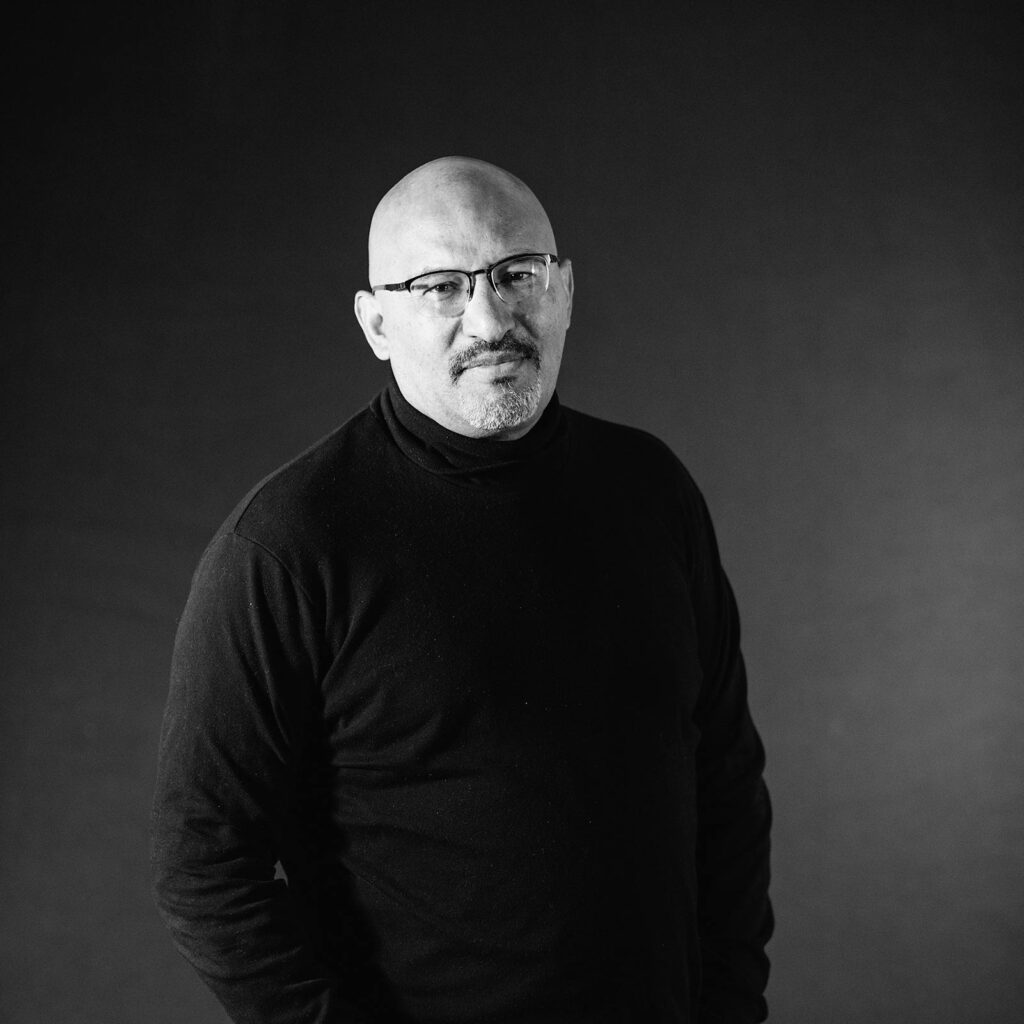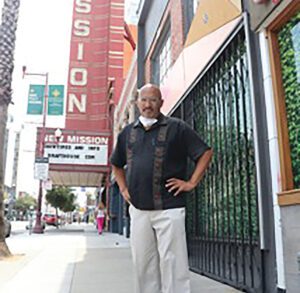
Roberto Lovato ’18 (Antioch Los Angeles, MFA) sits inside La Boheme, the same Mission neighborhood café where the voices of poets like Piri Thomas, Juan Felipe Herrera, Diane Di Prima, and Jack Hirschman still resonate. Over the previous five years, he’s spent countless hours there, writing. Noise-canceling headphones wired to an open laptop sitting on a vintage Singer sewing machine that doubles as a table are strapped over his bald head and cover his ears. His eyes are fixed on the screen as he waves his hands playing air guitar.
I stand in front of him. He looks up and pulls off the headphones. “Bro, have you heard this song, Pasame a Buca, by Rita Indiana?” He hands me the headphones and coughs a half laugh. “Listen to that badass bass line. That’s the shit I listen to when I’m about to go into dangerous places.”
I know this look. I recognize this laugh. We’ve been friends for over forty years. This is the look, inspired by song, of a breakthrough in his writing. Sometimes the song leads to the discovery, other times the discovery leads to the song. He is a man inspired.
He’d been writing a scene in his debut memoir Unforgetting: A Memoir of Family, Migration, Gangs and Revolution in the Americas where he enters an area of El Salvador controlled by the infamous MS-13 gang, to meet with Santiago the gang leader. “I didn’t know what to expect,” he says. “Fear is part of the deal.” Roberto’s mind is in constant motion, always seeking to discover, or uncover. His life has followed a circuitous path in search of not just his own truth, but also that of his family, his country of birth—the United States—and the country of his heritage, El Salvador. His path has earned him many friends who are drawn to the integrity that comes from living an unapologetic life. It has earned him some enemies as well. But he remains undeterred, so solid are his convictions, so unwavering his values.
I met Roberto when he was a young teen. He would come to watch our Sunday soccer games at Crocker Amazon Park in San Francisco. His older brother Ramon and I played on the same team. Roberto was an innocent kid kicking the ball around. He had yet to realize his revolutionary inclination.
“I’ve always had a revolutionary sensibility,” he says now. “Revolution is at the very marrow of my being.”
I sit across from him and open my laptop. We’re writing our final manuscript to complete the MFA at Antioch University. His is the first draft of his memoir. Like Rodolfo in the café’s namesake opera, La Boheme, who throws his poems into the fire for warmth to survive, Roberto’s words warm and sustain him, and his life can also be expressed in four acts.
Act I – The Anger
In 1981, when he was eighteen, Roberto joined me, his brother, and another three friends on a month-long trip to Hawaii. He proudly told stories of his furious, often bloody encounters back home and of his contentious relationship with his father. The easiness and “hang loose” attitude of the islands didn’t completely mask his simmering anger. He also recognized that a change was necessary, otherwise only tragedy waited.
“I was angry,” he says. “I didn’t understand the root of it.
All I knew was that it was there, all the time, and I did things I’m not proud of.”
Act II – The Search

A year later, seeking a way out, he sought refuge in Christianity and became a born-again Christian. He believed that was the path to quell his rage, the source of which remained elusive. He dove into his newfound religiosity with the same fervor that has since fueled his mission to serve others, be it as a friend, partner, social justice activist, organizer, son, or brother.
“I knelt down in 1984 and prayed for the election of Ronald Reagan,” he says today, shaking his head in disbelief. “I’m not angry any more. But the last time I felt that uncontrollable fury was when I saw the devastation that U.S.-trained death squads and ‘Made in the U.S.’ bombs had wrought on El Salvador and its people during Ronald Reagan’s Presidency. I’d never felt such contempt for any man before or since.”
Act III – The Discovery
Roberto orders a lavender tea from Awad, La Boheme’s owner, a burly man of few words. Lavender for Roberto is at the core of his resilience. He’s long used it to aid his memory and “ . . . to carry me through the many civilizational calamities I’ve witnessed—and overcome,” he says.
Our conversation is interrupted when a man with leathery brown skin, and deep-set eyes walks along 24th street and recognizes Roberto through the window. The man speaks Spanish and tells Roberto about a demonstration happening at 6 pm that day, to protest evictions in the rapidly gentrifying Mission. “It’ll be good to have you there,” the man says. “I’ll try,” Roberto answers.
It’s not uncommon to be interrupted by passersby. Roberto is as much a part of the Mission as the Mission is a part of him. Aside from his writing, Roberto’s years of work as an organizer, strategist, and social justice activist have earned him the reputation of someone who can get things done.
He is always ready to help.
“I love community gatherings,” he says. “But even more than the gathering itself I love the buildup to it and seeing people come together to pitch in for the benefit of others.”
In the fall of 1984 he began his studies at University of California. Through reading philosophers like Carl Jung, Erich Fromm and Immanuel Kant he questioned his choices, and it drew him away from his radical evangelical life.
Later, in the early nineties, by then living and working in Los Angeles, he met G, his eventual partner. “She changed my life,” he says. “She taught me what it meant to be a revolutionary.” A victim of unspeakable terror, she’d remained a compassionate and loving being. “It was my first glimpse at how the sublime and the beautiful can live alongside trauma.” It was a discovery that would lead him to El Salvador in the middle of a civil war and join the struggle against the U.S.-backed government. That moment would forever change how he viewed the country of his birth.
“When I saw the scale of mass murder and death the U.S. brought to El Salvador, and the face of a mother searching for her disappeared child, I gave up calling myself American. If I do so now, it’s with an accent on the ‘e’. Américan.”
After his return to the United States in 1991, Roberto continued to work tirelessly, writing and leading grassroot organizations to help redefine the image of Central Americans, especially Salvadorans, in this country.
Act IV – The Uncovering
“There is a quote by Jose Ortega y Gasset that has guided me along the way,” Roberto says. “Life is a petty thing unless it is moved by the indomitable urge to extend its boundaries. Witnessing the war and the trauma of the Salvadoran people led me to look into the abyss of my own history, my family’s trauma, and to tear down those boundaries. It’s why I wrote this book,” he says about his memoir. “And to tear down those images of El Salvador
and Salvadorans that define them only as violent, ignoring their resiliency, tenderness, and love.”
“And what have you learned about love?” I ask.
“I’ve learned that love has to do with dreams,” Roberto says. “They help us see our deeper selves. To love someone is to help them realize their dreams. To love yourself is to realize your own dreams.”
“You’ve lived a remarkable life my friend. How would you want to be remembered?”
He pauses, turns to look out the window, and draws a deep thoughtful breath.
“As a man who was always bold in word—and in deed,” he says.
“Let’s get something to eat,” he adds. “We still have time to make that protest.”
#DignidadLiteraria
Throughout his journalistic and literary career, Lovato has pointed to the dearth of visible works published by Latinx authors, particularly by the big five publishing houses. “And the advances to those that are published pale in comparison to those paid to white writers for lesser books. Some of those same white authors are getting those advances to tell our stories,” he says. Despite the fact that his own book is published by one of the big five (HarperCollins), he is aware that he is in the minority.
The publication of American Dirt and the seven figure advance that the writer received for that book, prompted him to take action and establish #DignidadLiteraria. Along with writers Myriam Gurba and David Bowles this movement is confronting and exposing the disparities and blatant biases in the publishing industry towards Latinx authors. Lovato’s strategizing and organizational skills led to a meeting with McMillan (the parent company of Flatiron Books, which published American Dirt) that eventually prompted major changes in their corporate structure and forced them to revise their model to ensure more equitable inclusion of Latinx writers in their titles. “It’s going to take time,” he says. “The fight is not over, but this is a good start.”



